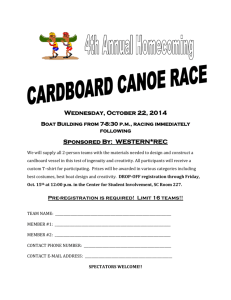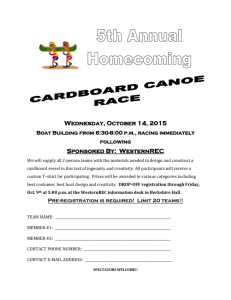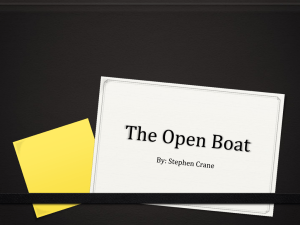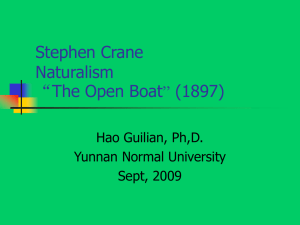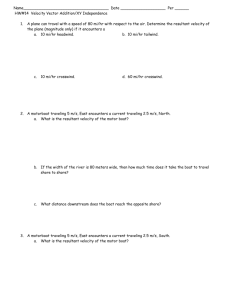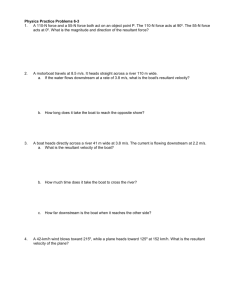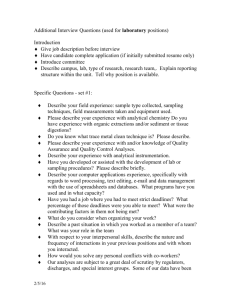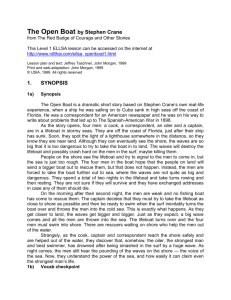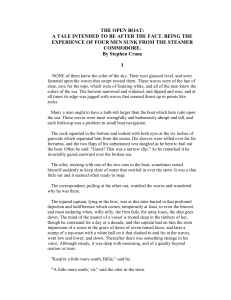stephen crane`s "the open boat
advertisement
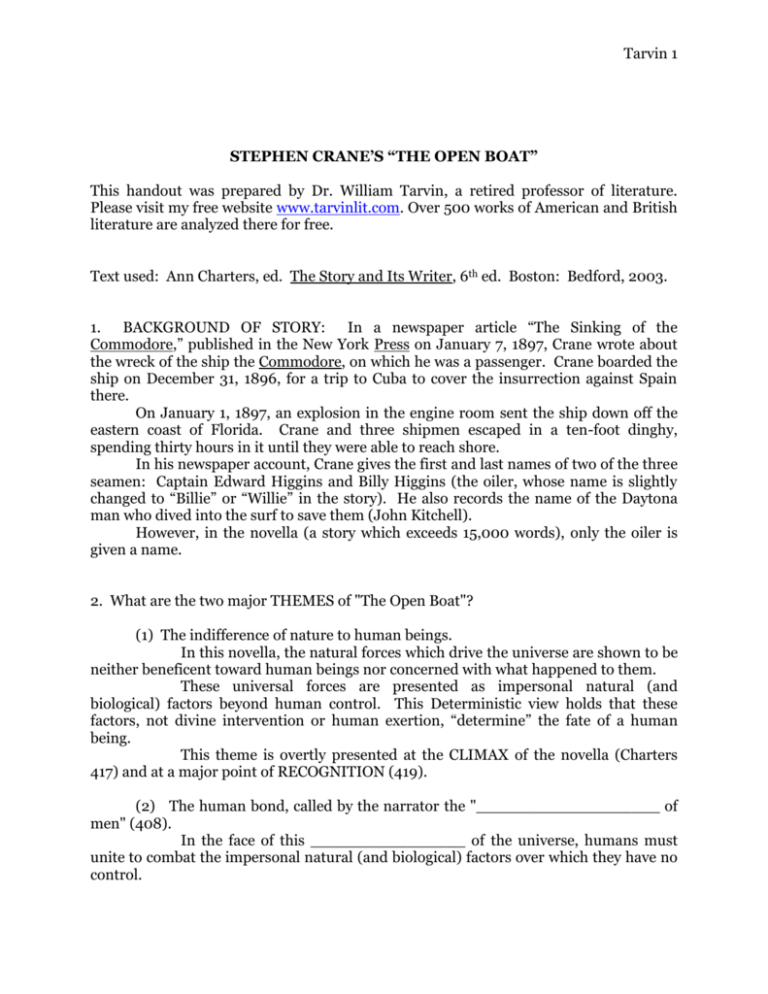
Tarvin 1 STEPHEN CRANE’S “THE OPEN BOAT” This handout was prepared by Dr. William Tarvin, a retired professor of literature. Please visit my free website www.tarvinlit.com. Over 500 works of American and British literature are analyzed there for free. Text used: Ann Charters, ed. The Story and Its Writer, 6th ed. Boston: Bedford, 2003. 1. BACKGROUND OF STORY: In a newspaper article “The Sinking of the Commodore,” published in the New York Press on January 7, 1897, Crane wrote about the wreck of the ship the Commodore, on which he was a passenger. Crane boarded the ship on December 31, 1896, for a trip to Cuba to cover the insurrection against Spain there. On January 1, 1897, an explosion in the engine room sent the ship down off the eastern coast of Florida. Crane and three shipmen escaped in a ten-foot dinghy, spending thirty hours in it until they were able to reach shore. In his newspaper account, Crane gives the first and last names of two of the three seamen: Captain Edward Higgins and Billy Higgins (the oiler, whose name is slightly changed to “Billie” or “Willie” in the story). He also records the name of the Daytona man who dived into the surf to save them (John Kitchell). However, in the novella (a story which exceeds 15,000 words), only the oiler is given a name. 2. What are the two major THEMES of "The Open Boat"? (1) The indifference of nature to human beings. In this novella, the natural forces which drive the universe are shown to be neither beneficent toward human beings nor concerned with what happened to them. These universal forces are presented as impersonal natural (and biological) factors beyond human control. This Deterministic view holds that these factors, not divine intervention or human exertion, “determine” the fate of a human being. This theme is overtly presented at the CLIMAX of the novella (Charters 417) and at a major point of RECOGNITION (419). (2) The human bond, called by the narrator the "___________________ of men" (408). In the face of this ________________ of the universe, humans must unite to combat the impersonal natural (and biological) factors over which they have no control. Tarvin 2 3. PLOT: Why may this novella have seven sections? The seven sections may refer to the seven seas or the “seven ________ gods” (414). 4. BEGINNING: Section I introduces the four main characters. List and briefly describe these joint PROTAGONISTS. (1) The fat _________ whose job is to bail out the dinghy. (2) The ________ (a member of the ship’s engine room crew); his name is given as _____________ (405). (3) The injured ________________ whose arm is in a sling. (4) The ____________________ who is assisting the oiler in rowing the boat. 5. Also, Section I establishes the setting. It is a “_______-foot dingey [dinghy]” (406) adrift in an ocean. The ____________ is the ANTAGONIST since its relentless waves pound the small boat, seeking to overturn or swamp it, thereby drowning the four men. It is an oppressive Antagonist since, as the first two sentences of the novella state, it cuts the men off not only from ____________ but also from the _____________. The CONFLICT of the novella, consequently, is Protagonists vs. Nature. 6. Sections I and II suggest that the men are inconvenienced, but not panicky. In fact, the cook and the correspondent do not argue about whether they will be saved, but about a semantic distinction between a ___________________________ and a ____________________ (406). The men are optimistic, yet feel “[t]o express any particular ______________ at this time [. . .] would be ____________ and stupid” (407). 7. What instance of FORESHADOWING occurs in Section II in a comment by the bailing cook? “Yes! If we don’t catch hell in the ___________” (407). In Section VII, as they attempt to reach shore, they do “catch hell.” 8. Briefly summarize the sea gull episode, explaining what makes its comic. How does this animal contrast with another one from Section V? A sea gull lands on the ________________ head. He must suppress his natural response of knocking the bird off his head since an “______________ gesture Tarvin 3 would have __________” the boat (407). Instead he gently brushes the bird away with his hand. The __________, of Section V, is more ominous animalistic threat (416). 9. Why is the sighting of land the INCITING MOMENT? Having sighted ___________, will they be __________ to get there? If they do make it to shore, what effect will the experience at _________ have on them, or what lessons will they bring to shore from their experience at sea? 10. The men immediately believe that having sighted land, they will get there quickly. What is the next to the last word of Section II? “______________” (408). 11. With the Characters introduced, the Setting established, and the Inciting Moment presented, the Beginning of the novella (Sections I and II) ends, and the Middle of the novella (Sections III-VI) begins. In the Middle, of course, complications will develop and a clearer understanding of the characters and of the themes of the story will emerge. What major theme is introduced at the opening of Section III? Give two examples from this section which show each of these diverse men, not looking out for himself, but working as a team. The human bond or “________________ of men” (408) theme. The men know that to survive they must obey the most experienced person in the boat, the ____________, who “could never command a more _____________ and swiftly ________________ crew than the motley three of the dingey [dinghy]” (409). The captain gives up his _________________ to serve as a sail in order to “give you two boys a chance to _________” (409). 12. When the men see a lighthouse, they become optimistic or filled with “a quiet _________________” (410), believing that those manning the lighthouse will quickly rescue them. What two actions of the men in the boat manifest this optimism? They light up and smoke the _________ and take a _____________ of ______________. 13. Section IV begins with the realization that either the “life-saving station” (41011) is unmanned or those manning it do not see them. What decision does the captain make? “‘Well,’ said the captain, ultimately, ‘I suppose we'll have to make a _______ for Tarvin 4 ourselves’” (411). Knowing that all of them might not make it through the roaring surf, they exchange what? _______________________ 14. The second major THEME of the novella is overtly presented here through the thoughts of the men. What ideas about the universe do the men formulate? Each man questions the fairness of those who control the universe--called “the ___________ mad ___________ who rule the sea”--in allowing them “to come thus far and ______________ sand and __________” (411). These superhuman forces seem to mock humans—ironically presented as ___________—by bringing a person close enough to “___________ the sacred ______________ of _____________,” only to “have my _____________ dragged away” (411). Each man next berates these superhuman universal forces—now termed “this old ___________-woman, ___________”— not competent to govern “men’s ___________” (411). “If she has decided to ___________ me, why did she not do it in the _______________ and save me all this trouble [of rowing the boat almost to the land]. The whole affair is ____________. . . . But, no she cannot mean to drown me. She ____________ not drown me” (411). The man considers “shak[ing] his _________ at the clouds” (411) and cursing those who govern the universe. 15. What ideas about the forces governing the universe are presented in this passage? (1) The men in the boat do not doubt that there are superhuman forces governing the universe. (2) Instead they present these superhuman forces as incompetent or wishing to, even delighting in, tormenting human beings, that is, making people miserable. These ideas will change as the novella develops. 16. What happens on the first attempt of the men to take the boat into shore? The __________ is too rough and the _________ says it will soon break up the boat. The ___________ decides to take it back out to sea. The phrase “_________ to sea again” (411) is used ironically. 17. What is the IRONY in the episode involving the people seen on the shore? When the men in the boat see the first man waving the coat, they are ______________ that aid will be on the way. However, the men soon realize that as more people come up (the man on Tarvin 5 the _______________ and the people on the _________), ironically, all of them apparently misjudge the situation; they think that the men in the boat are simply out _____________. As one of the men (probably the correspondent) sarcastically comments, these people have come to “see us ________” (413). The men go from the thrill of expecting the people on the shore to rescue them to the despair of cursing one of them as an “idiot” (413) and “feeling like soaking [slang for “giving a heavy blow to,” although in some editions “corrected” to “socking”] him one, just for _________” and for being “so damned ______________” (414). As night sets in and the boat drifts northward, the ____________ bus and the _______________ on the shore are lost; the men in the boat are again cut off from other ___________ beings. 18. At this point, when the men in the boat have been so obviously misunderstood by the people on the shore, there is a second, perhaps more poignant, repetition of what deterministic speech? “If I am going to be _____________—If I am going to be ______________, why, in the names of the __________ mad gods who rule the sea, was I allowed to come thus far and ________________ sand and _________? Was I brought here merely to have my _________ dragged away as I was about to __________ the sacred ______________ of __________” (414). 19. Section V returns to the human-bond theme. Explain how this theme is presented. No-one complains or thinks only about his own comfort or needs. The two healthy men who take turns ____________ the boat never malinger in order to trick the other into doing more work: “The plan of the _____________ and the _________________ was for one to row until he lost the __________________, and then arouse the other from his sea-water ___________ in the bottom of the boat” (415). They are exceedingly ______________ to each other: “‘Will you _______________ me for a little while?’ he [the oiler] said, ______________” (415), and, “‘Oh, I’m awful __________, Billie,’ said the correspondent, _______________” (416). The sleeping men, huddled with their arms around each other, are portrayed as “the ___________ of the _____________, a grotesque rendering of the old ____________ in the __________” (416). This image of ____________ conveys the helplessness (and perhaps innocence) of humans when confronted by the massiveness of the seemingly malignant natural forces of the universe. However, the image also reinforces the human-bond theme that humans can survive only by ______________ together (for warmth, safety, sympathy, etc.). Tarvin 6 20. How is the shark which appears in Section V a SYMBOL? The appearance of the shark suggests to the correspondent that their __________ will not only be by drowning, but also that they will be horribly mutilated. The shark is called metaphorically “a __________________ knife” and “the thing” that one dreads to be left alone with, producing a distinct “horror” in him (416). The shark thus is a symbol of the seeming desire of nature to torture and torment human beings. 21. Section VI is the CLIMAX of the novella. Why? By fully exploring and tying together the two themes, Section VI shows that more important than the narrow issue of whether these four men _____________ is the broader one of what humanity as a whole (from the author's point of view) can learn about human beings and the universe from the experience at __________ of these four men. The correspondent earlier called this “the __________ experience of his life” (409). It is so because the lessons learned from the sea and taken to the land will help (the author suggests) the Homo sapiens species to survive. As is later noted, the three who survived this ordeal became “_______________” of “the great sea’s __________” (422). Thus the questions asked at the Inciting Moment are both answered ironically. The _____________ of the four men is less important than the lessons about the survival of the ____________, which they take from their experience at sea. Secondly, the recognition of this lesson comes not after their life-anddeath confrontation with their antagonist, the ocean, but ____________ the men confront the full antagonism of the ocean. 22. In Section VI, what does the correspondent (whose thoughts are said to represent those of the three other men) first recognize about nature and the universe? He begins with the third repetition of the “If I am going to be _______________” speech, railing again against the “seven _________ gods who rule the sea” and bemoaning the apparent “abominable ______________" (417) of what is happening to them. These ideas reinforce those presented in Section IV that the presiding supernatural forces wish to torment human beings. However, in the next paragraph, a crucial reversal occurs: The ____________________ concludes that there are no “mad gods”; instead there are simply natural forces (or natural laws) which have no more concern for human beings than they do for a piece of dirt or a waft of sea-spray. Nature is not hostile, but indifferent, to human beings (as it is to all other species or aspects of the universe). 23. Examine the following passage which spells out the men’s ideas about the Tarvin 7 indifference of nature. “When it occurs to a man that ____________ does not regard him as important and that she feels she would not _________ the ______________ by disposing of him, he at first wishes to throw ________________ at the ______________, and he hates deeply the fact that there are no ______________ and no _____________. Any visible expression of ______________ would surely be pelleted with his _____________. Then, if there be no ______________ thing to hoot he feels, perhaps, the desire to _______________ a _________________ and indulge in ____________, bowed to one ___________, and with hands supplicant, saying: ‘Yes, but I __________ myself.' A high cold __________ [indifference to his prayer] on a _______________ night is the word _______ __________ that she says to him. Thereafter, he knows the ______________ of his situation” (417). 24. What is the second thing (about human beings) which the correspondent recognizes? The correspondent remembers reading a poem about a _____________ dying in Algiers and notes that as he read this incident he was “perfectly ________________” (417) to the fate of the imaginary soldier. Now, however, in the face of the indifference of nature toward human beings, the correspondent realizes that people must never be _____________ to each other. Since nothing else in the universe cares for the survival of humans, they must forge a human bond. Thus the correspondent says at that moment, even the imaginary soldier in Algiers became “a _________, living thing [. . .] an actuality—stern, ______________, and ____________ (417); [h]e was __________ for the soldier of the Legion who lay dying in Algiers" (418). 25. The END of the novella consists of Section VII. The captain makes the decision that since it is apparent no help is coming, they must try to save themselves by taking the __________ into shore for a second time. He reasons, “If we stay out here much longer we will be too _____________ to do anything for ourselves at all” (419). 26. What conclusion about the universe, made in the last section, does the correspondent reaffirm? “Nature] did not seem _____________ to him then, nor _________________, nor __________________, nor _________. But she was ______________, flatly ________________.” He was “impressed with the ________________ of the ________________,” and “in this new ________________ [of course, this word Tarvin 8 is used ironically] of the grave-_________” (419), he wishes that he had treated fellow humans beings _____________. 27. What are two final REVERSALS? (1) The ones who _____________ (the fat cook, the injured captain, and the inexperienced correspondent) are the ones who probably should ______ have made it. The one who ______________ (the strong oiler) is the one who probably should have ____________. Physical attributes seem to have nothing to do with _______________. (2) Once the men have made it to safety, the people on the _____________, who had inadvertently ignored or misunderstood them earlier, rush to comfort and “______________” (427) them. 28. What is a central RECOGNITION? Significantly, the ones who bond with each other are the ones who ____________: the captain, the _________________, and the correspondent communicate with one another during the swim to shore. The ________________ had headed out on his own. 29. What is the CATASTROPHE? The death of _____________, the oiler; probably as a tribute to him, he is the only man in the boat who is given a _____________. Tarvin 9
